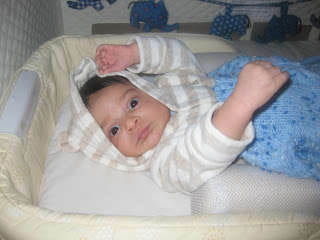Time Off With Baby, Part V: Enlightenment Beckons
"Happy Mother's Day"
"Happy Mother's Day"
Happy Mother's Day, Mamas! And Happy Mother's Day to the children who made you mothers and the partners and fathers who stand beside many of you each day!!
It's timely on the eve of Mother's Day 2013 to explore what it means to be a mother in America. If you read my article on www.glittersnipe.com (a fantastic politics, social commentary, travel and style rag I highly recommend), then you recall that FMLA may have taken only the wee-est baby steps toward meaningful family policy. But there is one shining example of what this nation can do to support families, society, and humanity.
We've talked about the benefits of paid care leave for children, moms, dads, businesses and the economy, and society. But Time Off With Baby takes this issue to its endgame. After comparing U.S. policies to those in every other industrialized nation in the world, Zigler, Muenchow, and Ruhm reviewed Californian policies, now over ten years old, and recommend an American policy going forward that echoes California's. Here's what that is, and how it affects families in the Sunshine State.
Through combined state leaves, most women have been able to take as much as 16 weeks off with job protection, while collecting about 55% of their wages for 10 to 12 weeks since 1979. Since 1992 Californian moms have had access to as many as 26 to 28 weeks of job protection from combined sources: pregnancy disability (16 weeks of job protection), CFRA (California Family Rights Act, 12 additional weeks of protection for parental leave); and temporary disability (4 weeks of partial pay before birth and 6 to 8 weeks after birth).
But California reached even deeper enlightenment in 2002 and approved paid care leave, which prevents parents from losing their jobs and secures again about 55% of wages for family care leave (covered by a payroll tax) after the birth of a child for just one reason: "to promote time off for new parents to spend with their newborn or newly adopted children" - solely for the purpose of attachment and attunement.
A full-time working Californian couple taking advantage of all policies can now get 26 - 28 weeks off for mama, 20 weeks partly paid, and 6 weeks off for papa with some pay - all of this covered by job protection. And Californians are taking full advantage of these protections and benefits, which are changing gender roles in good ways with more and more men taking advantage each year, and keeping families financially afloat during this critical period. These policies also encourage nursing with average breastfeeding terms going from 5 to 9 or 11 weeks, and allow families to find childcare that is a better fit for everyone.
And how are businesses faring? Over six years after PFL went into effect, 253 private for- and non-profit businesses were surveyed about their experience: 89% saw no or positive effects on productivity; 91% noted no or positive profitability; 93% saw no or positive effects on employee turnover; and almost 99% claimed no or positive employee morale due to the policy.
As we know low wage earners are unable to take advantage of FMLA's job protections with 75% of them saying they couldn't afford time off. In contrast, we see California's PFL cutting that disparity significantly with the most Californians taking advantage of these policies earning $12,001 to $48,000 per year. Still, about a third of those who do not claim benefits in CA say they're afraid of losing their jobs, provoking trouble at work, or experiencing career setbacks.
A Federal policy that required at least partial pay during job protected maternity, paternity, and care leave would even the playing field. When paid care leave becomes the company and national cultural norm, stigma will decrease, expectations of leave will increase, and businesses will meet the challenge as families finally begin to feel the relief that paid care leave allows.
As it stands, we have to ask if American men and women can afford to have children at all, if we cannot even afford to be home with them for 4 or 6 weeks let alone 20 to 28. And I find myself asking what the purpose of life and love are, if we cannot use them to create and sustain life. For me, this means more than than writing poetry, helping good people get grants, enjoying the natural world with my friends, and celebrating Christmas. It means seeing my son's shining face each day, and helping him learn to walk this earth creating a meaningful life that will also see life grow anew from his own love. It means hope in humanity, and faith in our ability to do what is right for one another, and especially for the most vulnerable among us.
I hope you signed the petition on Democrats.com, and I hope you will sign again with the National Partnership for Women & Families and Working Mother magazine to fight for PAID CARE LEAVE, wishing the many mothers you know and love a "Happy Mother's Day", this year and in years to come.
As always, leave your comments, questions, hopes and dreams below!!
(In 2010 AZ, HI, MA, Missouri, NH, NY, OR, PA, TX, and VT introduced but did not enact paid family leave laws. NJ has such a law, but I have not covered it here as California's policies rose up as exemplary in Time Off With Baby.)





